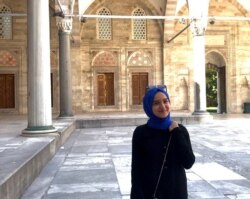Student Union
Code Yellow Has Student Quarantined in Qatar

My studies already disrupted by a 1,400 mile trip from Ethiopia, I heard my phone ping to tell me I’d be on the move again. This time, to a different COVID-19 quarantine facility, 20 minutes away.
My school — Northwestern University in Evanston, Illinois — is in the American Midwest, but I attend classes in Qatar, at the university’s Doha campus in the Gulf States region. I am working toward a bachelor’s degree in journalism, remotely, like most of the world’s students, because the COVID-19 pandemic has shuttered campuses and pushed classes online.
I had just returned from my home country, and was quarantined at a hotel in Doha for the standard seven days before I could join the general population. When the COVID-19 app on my phone failed to turn from quarantine yellow to go-ahead green by Day 7 after my entry COVID test, I knew I wouldn’t be set free.
My phone app — called EHTERAZ, or “precaution” in Arabic — is a contact-tracing and risk detecting app, operated by the Ministry of Public Health in Qatar and used by all residents and visitors.
While green indicates COVID-19 negative, yellow means quarantine, and red says COVID-19 positive. No one can enter an establishment, restaurant or mall unless the QR code on their EHTERAZ app shows a green health status.
I’d be going next to a special quarantine dormitory in Education City, a section of clustered universities, to wait for my app to turn green.
Education City (EC) hosts well-known, international universities, such as Weill-Cornell, Carnegie Mellon, Virginia Commonwealth, Georgetown, Texas A&M, and my school, Northwestern.
It is home to about 8,000 students. About half are Qataris. The rest come from Latin America, East and South Asia, and North and Sub-Saharan Africa and a few from Europe. Housing is divided by gender.
Started in 1997 with Virginia Commonwealth University, EC has slowly become a hotspot for other international satellite campuses.
Nearby, it hosts the sustainably designed Oxygen Park, known as the “green lung” of the 12-square-kilometer development, according to the Qatar Foundation website.
Other recreational, artistic and research facilities include the Al Shaqb riding club, showcasing Qatar’s long-standing equestrian culture of Arabian horses, and the Arab Museum of Modern Art, featuring modern and contemporary art from the Arab world.
It also hosts the glittering, expansive Qatar National Library, which is open to students. And the Education City Stadium, completed last year and earning a five-star Global Sustainability Assessment System certification, will be one of the venues for the 2022 FIFA World Cup matches.
In March 2020, when COVID-19 was declared a pandemic, some of the international students studying in EC cleared out for home. But many remained in Doha in lockdown.
In March, the Ministry of Public Health imposed lockdowns of almost all public spaces, such as retail stores, places of worship, entertainment, restaurants and cafes.
“Lockdown restrictions got extreme. Everything in the country was shut down, except for grocery stores,” said Azma Mulundika, a journalism sophomore at Northwestern University, from Zambia.
“I never left the dorms once the quarantine got severe because the cases were going up every day. It had reached 1,000-plus cases at some point, and that’s a really high number for such a small country,” explained Mulundika.
Most flights deemed high-risk for COVID were canceled. Students were afraid to travel home, worried that Qatar would close its borders and they wouldn’t be able to return to university. When outbound flights were available, students and residents had to complete extensive procedures.
“Traveling during that time from here to anywhere was such a lengthy process because you had to fill in all these documents and you had to get all these tests. And COVID tests are very uncomfortable,” Mulundika said.
“Coming back, you have to get quarantined. At some point it was two weeks, and then it recently reduced to one week, and you still have to quarantine when you go to the dorms,” she explained. “I just didn’t want to have to go through all of that.”
Sometimes the EHTERAZ notifications are delayed.
“After being in lockdown for seven days … you just want to go outside, see people, and interact,” said Mekdelawit Worku, a junior communications student at Northwestern University, from Ethiopia.
Students have reported a decrease participation and engagement with online classes.
“It’s not the quality [of the course content] but the actual lack of presence in the classroom,” said Worku. “When you’re present in the environment, you kind of feel obligated to be there. Home and class don’t necessarily go together.”
Other students report that online learning doesn’t work well with hands-on classes.
“Because we’re in science classes, a lot of our classes have labs that we need to be on site to do. And especially last year, a lot of our labs ended up being canceled,” said Zoha Baig, a second-year pre-med student at Weill Cornell University in Qatar.
“So, we basically have to try and take some sort of online counterpart instead of doing labs which made it harder to learn,” she said.
For students who remained in Doha, the Qatar Foundation, a non-profit organization responsible for launching Education City, fully covered housing and meals during the summer 2020.
But isolation and loneliness came with confinement, on top of maintaining schoolwork.
“I remember being sad, I remember being extremely depressed, and I remembered crying at some point,” Mulundika told VOA. “Being in quarantine and isolation by yourself is just kind of poison right now.”
“At first, I was just worried about people back home, my family and my friends all over the world,” Worku said. “But then I started to feel lonely when my family back home quarantined together and yet I was still here. As a student, you’re still stuck in this country and air travel is also shut down so you can't even go home even if you wanted to. Thinking about those things, there was a sense of feeling trapped but also grateful to be at a place where I have a good Wi-Fi and a safety net, to be honest.”
Selma Fejzullaj, a freshman student at Virginia Commonwealth University School of Arts arrived in Doha in September 2020 from Turkey. Fejzullaj took her classes online and had few opportunities to socialize.
“Until winter break, I did not have face-to-face interaction with my peers, as all my classes are online. All the activities I was attending were online clubs, so everything was through a computer screen,” said Fejzullaj.
As the pandemic drags on, students say the university experience is lacking.
“Right now, I do not feel as a university student since I did not have the university experience. I still cannot comprehend the fact that my freshman year will finish in less than 20 days. So, I really do hope that we go back to normal,” said Fezjullah. “I cannot see myself finishing my sophomore year also like this.”
Qatar is planning a controlled re-escalation of COVID-19 restrictions following a steady increase in the number of COVID-19 cases over the past few weeks, according to the Ministry of Public Health in February.
A few classes are resuming on a hybrid basis but almost all classes are online. Use of the library or a lab is allowed only for the COVID-19 negative. The app alerts users when they are near individuals with yellow or red status.
The Ministry of Public Health in Qatar has approved the Pfizer and BioNTech COVID-19 vaccine, and it will provide them to citizens and residents in Qatar for free. Students are eager for vaccination efforts to include them.
Sitting in quarantine in EC, I thought about how returning to Qatar would get me the vaccine earlier than if I had stayed back home.
Finally, my phone pinged again, and a green barcode appeared. I was elated, but exhausted, and promptly took a long nap once I reached my dormitory.
See all News Updates of the Day
- By VOA News
Competition grows for international students eyeing Yale

It’s tough to gain admission to Yale University, and it’s getting even tougher for international students as standout students from around the world set their sights on Yale.
The Yale Dale News, the campus newspaper, takes a look at the situation here.
- By VOA News
Student from Ethiopia says Whitman College culture made it easy to settle in

Ruth Chane, a computer science major from Ethiopia, writes about her experiences settling into student life at Whitman College in the U.S. state of Washington.
"The community at Whitman College made sure I felt welcomed even before I stepped foot on campus," she says.
- By VOA News
Claremont Colleges student gets a shock when she heads home to Shanghai

In The Student Life, the student newspaper for the Claremont Colleges, a consortium of five liberal art colleges and two graduate schools in Claremont, California, student Rochelle Lu writes about readjusting to her Shanghai home after spending a semester in the United States.
- By VOA News
Cedarville University aims to ease transition for international students

Cedarville University in the U.S. state of Ohio says it’s got more than 140 international students representing 44 countries.
Here, the school interviews Jonathan Sutton, director of international student services. He talks about his job and the opportunities for international students on campus.
- By VOA News
Morehouse College offers prospective students tips on applying and thriving

Morehouse College, a private, historically Black liberal arts college in the U.S. state of Georgia, offers a guide for international students interested in attending the school.
Among the tips to apply and thrive at Morehouse:
- Take advantage of the school’s orientation program
- Turn to the school’s Center for Academic Success for tutoring, support and more
- Immerse yourself in campus life via clubs and societies
- By Reuters
US reviews Columbia University contracts, grants over antisemitism allegations

The administration of President Donald Trump said on Monday it will review Columbia University's federal contracts and grants over allegations of antisemitism, which it says the educational institution has shown inaction in tackling.
Rights advocates note rising antisemitism, Islamophobia and anti-Arab bias since U.S. ally Israel's devastating military assault on Gaza began after Palestinian Hamas militants' deadly October 2023 attack.
The Justice Department said a month ago it formed a task force to fight antisemitism. The U.S. Departments of Health and Education and the General Services Administration jointly made the review announcement on Monday.
"The Federal Government's Task Force to Combat Anti-Semitism is considering Stop Work Orders for $51.4 million in contracts between Columbia University and the Federal Government," the joint statement said.
The agencies said no contracting actions had been taken yet.
"The task force will also conduct a comprehensive review of the more than $5 billion in federal grant commitments to Columbia University."
The agencies did not respond to requests for comment on whether there were similar reviews over allegations of Islamophobia and anti-Arab bias.
Columbia had no immediate comment. It previously said it made efforts to tackle antisemitism.
College protests
Trump has signed an executive order to combat antisemitism and pledged to deport non-citizen college students and others who took part in pro-Palestinian protests.
Columbia was at the center of college protests in which demonstrators demanded an end to U.S. support for Israel due to the humanitarian crisis caused by Israel's assault on Gaza. There were allegations of antisemitism and Islamophobia in protests and counter-protests.
During last summer's demonstrations around the country, classes were canceled, some university administrators resigned and student protesters were suspended and arrested.
While the intensity of protests has decreased in recent months, there were some demonstrations last week in New York after the expulsion of two students at Columbia University-affiliated Barnard College and after New York Governor Kathy Hochul ordered the removal of a Palestinian studies job listing at Hunter College.
A third student at Barnard College has since been expelled, this one related to the occupation of the Hamilton Hall building at Columbia last year.
Canada’s immigration overhaul signals global shift in student migration
From Europe to North America, nations are tightening their immigration policies. Now Canada, long seen as one of the world's most welcoming nations, has introduced sweeping changes affecting international students. The reforms highlight a growing global trend toward more restrictive immigration policies. Arzouma Kompaore reports from Calgary.
Trump administration opens antisemitism inquiries at 5 colleges, including Columbia and Berkeley

The Trump administration is opening new investigations into allegations of antisemitism at five U.S. universities including Columbia and the University of California, Berkeley, the Education Department announced Monday.
It's part of President Donald Trump's promise to take a tougher stance against campus antisemitism and deal out harsher penalties than the Biden administration, which settled a flurry of cases with universities in its final weeks. It comes the same day the Justice Department announced a new task force to root out antisemitism on college campuses.
In an order signed last week, Trump called for aggressive action to fight anti-Jewish bias on campuses, including the deportation of foreign students who have participated in pro-Palestinian protests.
Along with Columbia and Berkeley, the department is now investigating the University of Minnesota, Northwestern University and Portland State University. The cases were opened using the department's power to launch its own civil rights reviews, unlike the majority of investigations, which stem from complaints.
Messages seeking comment were left with all five universities.
A statement from the Education Department criticized colleges for tolerating antisemitism after Hamas' Oct. 7, 2023, attack on Israel and a wave of pro-Palestinian protests that followed. It also criticized the Biden administration for negotiating "toothless" resolutions that failed to hold schools accountable.
"Today, the Department is putting universities, colleges, and K-12 schools on notice: this administration will not tolerate continued institutional indifference to the wellbeing of Jewish students on American campuses," said Craig Trainor, the agency's acting assistant secretary for civil rights.
The department didn't provide details about the inquiries or how it decided which schools are being targeted. Presidents of Columbia and Northwestern were among those called to testify on Capitol Hill last year as Republicans sought accountability for allegations of antisemitism. The hearings contributed to the resignation of multiple university presidents, including Columbia's Minouche Shafik.
An October report from House Republicans accused Columbia of failing to punish pro-Palestinian students who took over a campus building, and it called Northwestern's negotiations with student protesters a "stunning capitulation."
House Republicans applauded the new investigations. Representative Tim Walberg, chair of the Education and Workforce Committee, said he was "glad that we finally have an administration who is taking action to protect Jewish students."
Trump's order also calls for a full review of antisemitism complaints filed with the Education Department since Oct. 7, 2023, including pending and resolved cases from the Biden administration. It encourages the Justice Department to take action to enforce civil rights laws.
Last week's order drew backlash from civil rights groups who said it violated First Amendment rights that protect political speech.
The new task force announced Monday includes the Justice and Education departments along with Health and Human Services.
"The Department takes seriously our responsibility to eradicate this hatred wherever it is found," said Leo Terrell, assistant attorney general for civil rights. "The Task Force to Combat Anti-Semitism is the first step in giving life to President Trump's renewed commitment to ending anti-Semitism in our schools."
- By VOA News
STEM, business top subjects for international students

The Times of India breaks down the most popular subjects for international students to study in the U.S.
STEM and business lead the pack. Read the full story here. (January 2025)
- By VOA News
Safety and visa difficulties among misconceptions about US colleges

U.S. News & World report addresses some of the misconceptions about U.S. colleges and universities, including the difficulty of getting a visa.
Read the full story here. (January 2025)
- By VOA News
Work opportunities help draw international students to US schools

US News & World Report details the three top factors in foreign students' decision to study in the U.S. They include research opportunities and the reputation of U.S. degrees. Read the full story here. (December 2024)
- By VOA News
British student talks about her culture shock in Ohio

A British student who did a year abroad at Bowling Green State University in Ohio talks about adjusting to life in America in a TikTok video, Newsweek magazine reports.
Among the biggest surprises? Portion sizes, jaywalking laws and dorm room beds.
Read the full story here. (December 2024)
- By VOA News
Harvard's Chan School tells international students what to expect

Harvard's T.H. Chan School of Public Health reaches out to international students by detailing the international student experience at the school.
Learn more about housing, life in Boston and more here.
- By Reuters
China unveils plan to build 'strong education nation' by 2035

China issued its first national action plan to build a "strong education nation" by 2035, which it said would help coordinate its education development, improve efficiencies in innovation and build a "strong country."
The plan, issued Sunday by the Communist Party's central committee and the State Council, aims to establish a "high quality education system" with accessibility and quality "among the best in the world."
The announcement was made after data on Friday showed China's population fell for a third consecutive year in 2024, with the number of deaths outpacing a slight increase in births, and experts cautioning that the downturn will worsen in the coming years.
High childcare and education costs have been a key factor for many young Chinese opting out of having children, at a time when many face uncertainty over their job prospects amid sluggish economic growth.
"By 2035, an education power will be built," the official Xinhua news agency said, adding that China would explore gradually expanding the scope of free education, increase "high-quality" undergraduate enrolment, expand postgraduate education, and raise the proportion of doctoral students.
The plan aims to promote "healthy growth and all-round development of students," making sure primary and secondary school students have at least two hours of physical activity daily, to effectively control the myopia, or nearsightedness, and obesity rates.
"Popularizing" mental health education and establishing a national student mental health monitoring and early warning system would also be implemented, it said.
It also aims to narrow the gap between urban and rural areas to improve the operating conditions of small-scale rural schools and improve the care system for children with disabilities and those belonging to agricultural migrant populations.
The plan also aims to steadily increase the supply of kindergarten places and the accessibility of preschool education.
- By VOA News
A look at financial aid options for international graduate students in US

The Open Notebook, a site focusing on educating journalists who cover science, has complied a list of U.S. graduate program financial aid information for international students.










